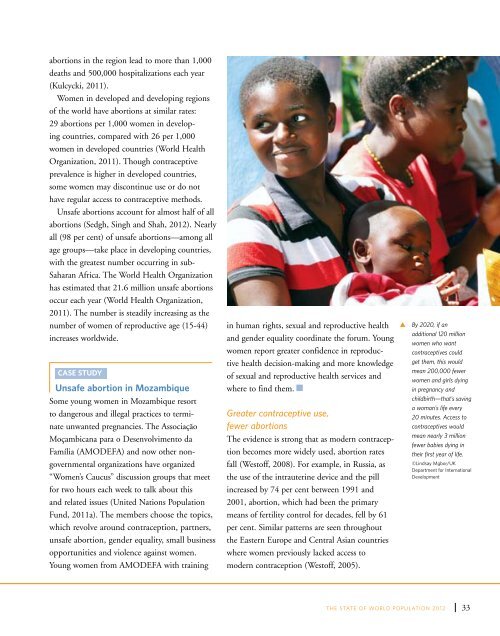State of World Population 2012 - Country Page List - UNFPA
State of World Population 2012 - Country Page List - UNFPA
State of World Population 2012 - Country Page List - UNFPA
Create successful ePaper yourself
Turn your PDF publications into a flip-book with our unique Google optimized e-Paper software.
abortions in the region lead to more than 1,000<br />
deaths and 500,000 hospitalizations each year<br />
(Kulcycki, 2011).<br />
Women in developed and developing regions<br />
<strong>of</strong> the world have abortions at similar rates:<br />
29 abortions per 1,000 women in developing<br />
countries, compared with 26 per 1,000<br />
women in developed countries (<strong>World</strong> Health<br />
Organization, 2011). Though contraceptive<br />
prevalence is higher in developed countries,<br />
some women may discontinue use or do not<br />
have regular access to contraceptive methods.<br />
Unsafe abortions account for almost half <strong>of</strong> all<br />
abortions (Sedgh, Singh and Shah, <strong>2012</strong>). Nearly<br />
all (98 per cent) <strong>of</strong> unsafe abortions—among all<br />
age groups—take place in developing countries,<br />
with the greatest number occurring in sub-<br />
Saharan Africa. The <strong>World</strong> Health Organization<br />
has estimated that 21.6 million unsafe abortions<br />
occur each year (<strong>World</strong> Health Organization,<br />
2011). The number is steadily increasing as the<br />
number <strong>of</strong> women <strong>of</strong> reproductive age (15-44)<br />
increases worldwide.<br />
CASE STUDY<br />
Unsafe abortion in Mozambique<br />
Some young women in Mozambique resort<br />
to dangerous and illegal practices to terminate<br />
unwanted pregnancies. The Associação<br />
Moçambicana para o Desenvolvimento da<br />
Família (AMODEFA) and now other nongovernmental<br />
organizations have organized<br />
“Women’s Caucus” discussion groups that meet<br />
for two hours each week to talk about this<br />
and related issues (United Nations <strong>Population</strong><br />
Fund, 2011a). The members choose the topics,<br />
which revolve around contraception, partners,<br />
unsafe abortion, gender equality, small business<br />
opportunities and violence against women.<br />
Young women from AMODEFA with training<br />
in human rights, sexual and reproductive health<br />
and gender equality coordinate the forum. Young<br />
women report greater confidence in reproductive<br />
health decision-making and more knowledge<br />
<strong>of</strong> sexual and reproductive health services and<br />
where to find them.<br />
Greater contraceptive use,<br />
fewer abortions<br />
The evidence is strong that as modern contraception<br />
becomes more widely used, abortion rates<br />
fall (West<strong>of</strong>f, 2008). For example, in Russia, as<br />
the use <strong>of</strong> the intrauterine device and the pill<br />
increased by 74 per cent between 1991 and<br />
2001, abortion, which had been the primary<br />
means <strong>of</strong> fertility control for decades, fell by 61<br />
per cent. Similar patterns are seen throughout<br />
the Eastern Europe and Central Asian countries<br />
where women previously lacked access to<br />
modern contraception (West<strong>of</strong>f, 2005).<br />
t<br />
By 2020, if an<br />
additional 120 million<br />
women who want<br />
contraceptives could<br />
get them, this would<br />
mean 200,000 fewer<br />
women and girls dying<br />
in pregnancy and<br />
childbirth—that’s saving<br />
a woman’s life every<br />
20 minutes. Access to<br />
contraceptives would<br />
mean nearly 3 million<br />
fewer babies dying in<br />
their first year <strong>of</strong> life.<br />
©Lindsay Mgbor/UK<br />
Department for International<br />
Development<br />
THE STATE OF WORLD POPULATION <strong>2012</strong><br />
33
















